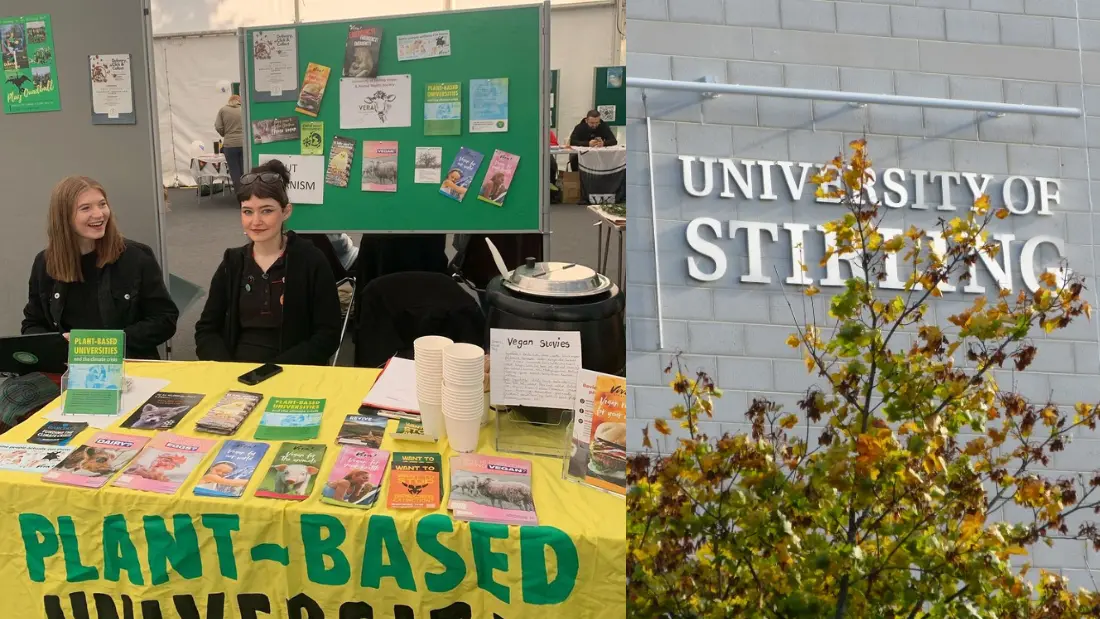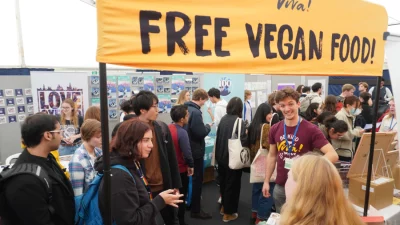A Stirling decision: First University Student Union to commit to going 100% vegan


Welcome to Stirling, Scotland: proverbial gateway to the highlands and also, as it happens, to our collective future.
Stirling’s Student Union recently made history by being the first such union to democratically commit themselves to a fully plant-based future: by September 2023, the SU’s menus will be at least 50% plant-based, with a 100% vegan status being attained no later than 2025.
This is monumentally good news for animals, people, and the planet!
The future is vegan
Viva! Campaigns’ investigations into farms like Hogwood, Flat House and dozens of others have shown conclusively that there is no such thing as ethical exploitation of animals for profit. The further we distance ourselves from these exploitative and cruel practices, the better – and we are convinced that more and more universities and institutions will follow suit in the very near future.
We also celebrate this news for the sake of the students themselves. The consumption of animal products has unequivocally been proven to have harmful effects on human health, including increasing the risk of developing various cancers, heart disease, diabetes and other diseases. Indeed, this news of the world’s first (soon-to-be) vegan Student Union follows on from the 2021 news of a hospital in Lebanon that committed itself to an exclusively plant-based menu for the sake of its patients – another world first, but it certainly won’t be the last!

Plant-based diets are best for the environment
But the motion, launched by the Plant-Based Universities campaign of Animal Rebellion, was not primarily about animals or human health. As Stirling SU pride themselves on having become the UK’s first carbon-neutral Student Union (as of 2019) and also voted to pass a motion declaring a state of climate emergency (in 2021), environment concerns are clearly at the top of their agenda – and this is no bad thing!
Quoting the United Nations’ injunction that “more ambitious action [is] needed now” when it comes to mitigating climate change, Stirling students have clearly taken this to heart in choosing to eliminate environmentally destructive (and morally objectionable) animal products from their campus. When it comes to mitigating climate change, Stirling students have clearly taken this ethic to heart in choosing to eliminate environmentally destructive (and morally objectionable) animal products from their campus.
As they note in their motion the emissions of the entire animal agriculture industry worldwide exceed those of the United States (Xu, Sharma et al., 2021). In fact, a more recent report has shown that combining just the top 15 meat and dairy producers into a hypothetical nation-state would render it the 10th largest greenhouse gas emitting country worldwide, and emit more than 80% of the methane of the entire EU.
Media controversy
Despite the watertight scientific case for the move, Animal Rebellion’s Plant-Based Universities campaign has – perhaps predictably – not been met with unanimously positive press.
“Woke Stirling University students blasted for banning meat and dairy from campus food outlets”, rants the Scottish Daily Express, citing many of the false claims and unscientific suggestions of the Countryside Alliance.
For instance, the Countryside Alliance urges Stirling SU to opt for “locally sourced meat and dairy with low air miles” – ignoring the facts that almost no food is actually transported by air and that even eating locally-sourced meat and dairy is still significantly worse for the environment than non-local plant-based products. Food miles typically contribute a very small absolute amount to the carbon footprint of any given food product.
Of course, one would not expect the Countryside Alliance to advocate for good, reliable scientific data when good, reliable scientific data does not support their case at all.

Freedom of choice – but for whom?
Mo Metcalfe-Fisher, a spokesman for the Alliance, also laments that the passing of the motion is “an attack on freedom of choice”. For whom? Certainly, many Stirling students will still eat animal products for the near future. The motion (sadly) does not cover Stirling catering outlets that are not run by the SU – though we hope they follow suit, and make good use of Viva!’s Vegan-Friendly University Catering Guide to do so.
However, the Plant-Based Universities campaign success and the successes of the vegan movement in general have the effect of giving freedom back to the animals that are no longer intensively reared and slaughtered for sandwiches. This is a freedom that is so much more fundamental than the apparent “freedom of choice” to eat whomever we like, regardless of suffering or consequence.
Given the fact that our human population has recently reached 8 billion, around a billion of whom are hungry at any given moment, the inefficiencies of animal agriculture are even more inexcusable. When Metcalfe-Fisher complains about freedom of choice, he ignores the freedoms of those people who are constantly malnourished due to the desire of the developed world to eat animals. Don’t forget, despite there being a billion people who lack good food and water each day, we somehow manage to fatten up 70 billion animals for slaughter at the very same time.
What’s next?
The move towards a vegan future is not only desirable and optimal, but necessary. Whatever the last holdouts of animal agriculture say, bodies of individuals like the Stirling Student Union committing seriously to building a plant-based future is exactly what our planet needs.
Viva! congratulates the Stirling Student Union and Animal Rebellion’s Plant-Based Universities campaign on breaking this exciting new ground, and we look forward to seeing who comes next!







